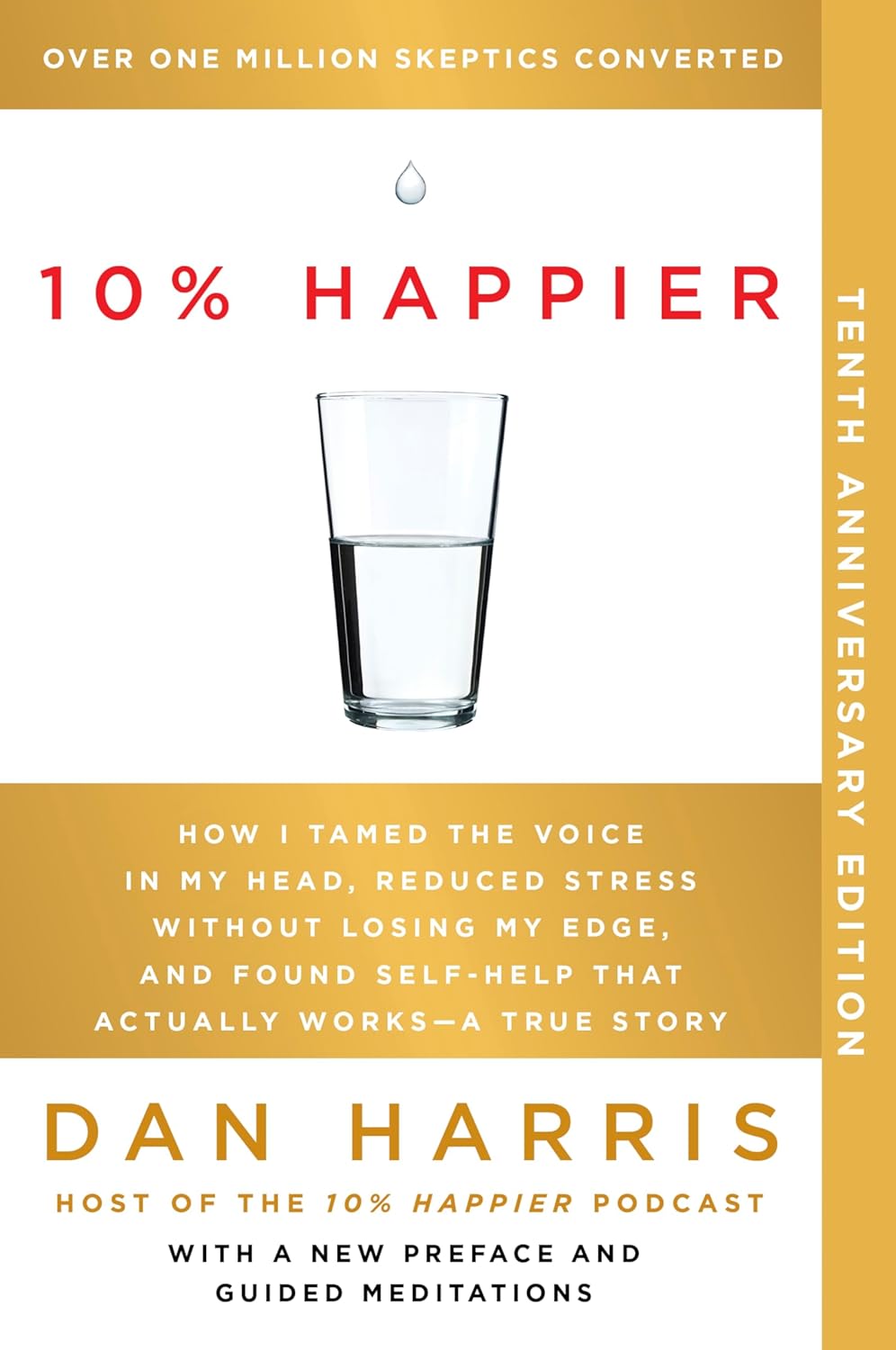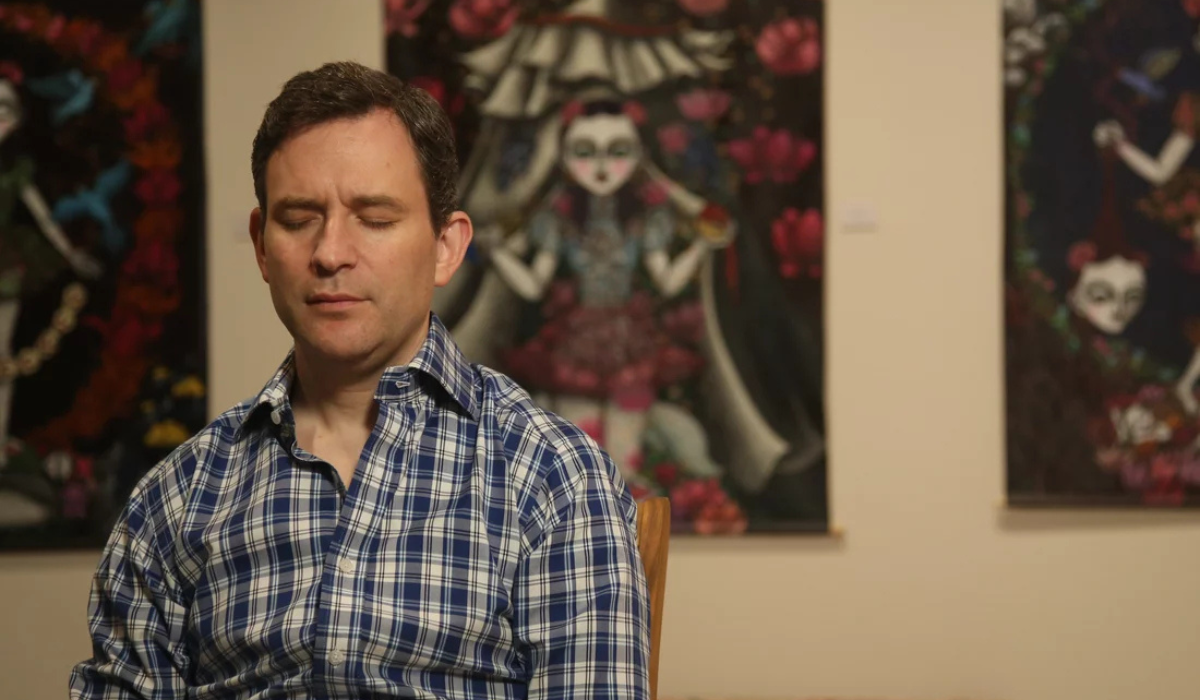Election Anxiety is Real. We Asked 10% Happier Author Dan Harris For His Top 3 Ways to Cope
Dan Harris wants you to take a moment and remember the last time you held the door open for someone.
What did that feel like? How did the person respond? Did the interaction shift how stressed out or anxious you were feeling, even just a little?
“One of the amazing things about the human animal is that despite the fact that we have all of these design flaws, there’s a feature in our operating system that is incredibly helpful, which is that if you do good, it feels good,” says Harris, author of the book, 10% Happier, and a new Substack where he offers articles, meditations, and actionable takeaways from his wildly popular podcast, 10% Happier with Dan Harris. “I think it’s underappreciated and under exploited—especially in anxious times when we feel helpless and hopeless.
During this hotly contested election season when many of us are feeling helpless and hopeless, The Sunday Paper sat down with Harris to learn more about how he tries to take action to absorb his anxiety, stay above the noise, and sit with uncertainty. His tips are ones we’ve already adopted—steps we’re confident you’ll want to try, too.
A CONVERSATION WITH DAN HARRIS
Why do you think the little things—like holding a door open for someone—are so powerful when it comes to helping us feel better
There’s a lot of data around how generosity or altruism is really good for you. Research shows that micro interactions—little interactions that many of us plow through mindlessly, like with the barista, the mailman, people in the office who you don’t really know that well, but take a minute to say hello to—can have a very powerful compounding effect on your well-being. This is always true, but I think it’s particularly helpful to remember now, when we’re in the middle of a tumultuous presidential election and so many of us feel like things are out of control.
One of the little phrases I really like though didn’t invent is this: Action absorbs anxiety. If you can do something—even just holding the door open for somebody—it’s a counter measure against the sense that we don’t have agency, or that everything’s out of our control and therefore terrible. Having one of these micro interactions isn’t going to fix the outcome of the presidential election. But it might change the complexion of your day.
How can we balance staying informed with staying above the noise in this stressful and loud moment in time?
There’s a line that’s very important for all of us to walk between being an engaged citizen and a crazy person. This is a balance, and I can’t strike the balance for you. You have to figure this out for yourself. Generally, that’s going to involve some trial and error, because we all have different nervous systems. I think having that line as a North Star is very helpful. We need to titrate our news consumption so that we are engaged and informed, but not on tilt.
What I find very helpful in this regard is mindfulness, which is an innate quality that we all have, and that can be developed through mindfulness meditation. It’s this self-awareness that allows you to know what’s happening in your body and mind right now, so that you’re not so carried away by it.
I think mindfulness is especially helpful when it comes to news consumption during the election, because it can help you notice, Oh, I’m on hour eight of doom scrolling, and I’m starting to type in all caps and say ridiculous things. Maybe it’s time I put the phone down. That’s just one example.
Here’s another example that’s helpful for me and that is going to sound counterintuitive and maybe even totally unacceptable for some: I’ve tried to make it a practice to engage with media platforms who have writers that that I don’t agree with. I don’t do it all the time, but I try to do it with some regularity. I do this because for me, understanding that the people with whom I disagree have logic and that there are reasons why they believe what they believe is much more soothing than blindly hating them.
While I find this practice challenging, I think it’s a way to rise above the noise, to get out of my tribal silo, and to get a sense of empathy for the way other people view the world.
What are the practices that are helping you the most right now?
I have many. The top three coming to mind are:
No. 1: Action absorbs anxiety. I want to be clear: I am a flawed and fallible person. My factory settings are basically frosty New Englander. This doesn’t come naturally to me. But I’ve found that making it a practice has been really helpful.
I try to notice when I have the urge to turtle up, to be cold, to isolate—and then I try to the best of my ability (and failing frequently, but not always) to lean in. Getting myself to fully engage can be uncomfortable, but it is ennobling and empowering. Making this a life practice is always helpful.
No. 2: Never worry alone. This is another expression that’s not mine, but it’s something I’ve adopted. We tend to approach our anxiety and anguish as a solo endeavor—but it’s much better to approach it as a team sport. The data are very clear that the No. 1 variable when it comes to human flourishing is not sleep, or exercise, or diet (although those things are very important). It’s the quality of your relationships. Why? Because stress is generally what kills us, and the best way to regulate stress is to have good relationships.
So, what better technique to draw upon during a tumultuous election than never worrying alone? Call your mother. Call your friends. Even better, get together with them and watch the election returns or gripe about what’s going on. Commiserate. There’s a good reason why “misery loves company,” as the saying goes: It’s because company can reduce misery! All through election week, I’m going to be doing live guided meditations for free on my website to help people not worry alone.
No. 3: Self-compassion. There’s a recent body of psychological research that was kicked off by an incredible researcher, Dr. Kristin Neff at the University of Texas. The idea is that most of us talk to ourselves like a drill sergeant, and we think that’s the best way to be effective. But the data shows very clearly that the best way to reach your goals and to be successful and happy is to talk to yourself like a coach. A coach doesn’t let you off the hook. They don’t ignore your mistakes. They’ll point out your mistakes but also talk to you in a reassuring way.
Dr. Neff has a three-step practice that you can do anytime, anywhere:
Step 1: Be aware that you’re in a tough moment.
Step 2: Remember that whatever you’re dealing with right now—anxiety about the election, resentment of a friend, addiction, sadness, depression, whatever it is—millions of other people are dealing with it simultaneously. You are not alone.
Step 3: Talk to yourself the way you would talk to a good friend. This step can be supercharged by something that I find embarrassing and don’t want anybody to see me doing: Put your hand on your heart or give yourself a hug. This is not saccharin nonsense; it’s backed up by hard data. When you put your hand on your heart or give yourself a hug, you are activating what Dr. Neff calls the mammalian care system.
When I do these three steps together—and particularly the third step, in my experience—I find it immediately settles my nervous system. If my anxiety comes back, I just do it again.
Do you have any advice when it comes to making sense of the polls? Who can we trust?
I try to consume very widely on this, and I also try to find sources that I trust. But the thing to know about the polls is this: It’s a tie race. It’s probably going to be a tie race leading into Election Day, and we probably won’t have a result for a while. We should be prepared for that. We should be prepared for uncertainty.
Here’s the thing: Humans are terrible at handling uncertainty in a universe that is constantly and non-negotiably changing. That is a setup for anxiety. I think we can use this time as an opportunity to practice being okay with uncertainty. In fact, I would reframe the entire election as a workout or a dojo—an opportunity to train yourself in skills that will help you in all of life.

Dan Harris is host of the 10% Happier Podcast. For 21 years, he worked at ABC News, where he was the co-anchor of Nightline and the weekend editions of Good Morning America. He also reported from all over the world, including war zones and presidential campaigns. Before joining ABC, he worked for local news outlets in Boston and Maine. He lives in New York with his wife, son, and a gaggle of rescue cats.
Please note that we may receive affiliate commissions from the sales of linked products.



